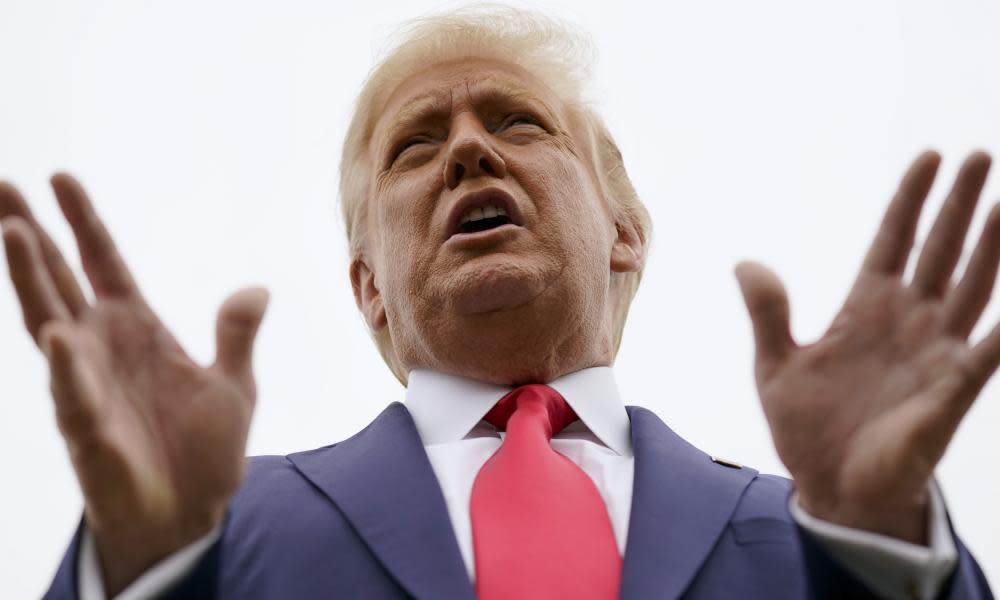Trump denies 'series of mini-strokes' after book reports mystery hospital visit

After it was reported that Mike Pence was put on “standby to take over the powers of the presidency temporarily” if Donald Trump had needed to be anesthetized during a surprise hospital visit last November, the president was moved to tweet a denial that he “suffered a series of mini-strokes”.
Related: Donald Trump v the United States review: how democracy came under assault
Previous speculation around the visit has centered on whether the president had a heart attack, which Trump has denied.
On Tuesday, he wrote: “It never ends! Now they are trying to say that your favorite president, me, went to Walter Reed medical center, having suffered a series of mini-strokes.”
Citing three anonymous sources, the novelist and anti-Trump campaigner Don Winslow has said he has been told Trump suffered a “series” of strokes.
Dr Sean Conley, Trump’s physician, said in a statement the president had not “experienced nor been evaluated for a cerebrovascular accident (stroke), transient ischemic attack (mini stroke) or any acute cardiovascular emergencies”.
Trump also wrote: “Never happened to THIS candidate – FAKE NEWS. Perhaps they are referring to another candidate from another party!”
The president, who is 74, has consistently accused Joe Biden, his 77-year-old opponent in this year’s election, of mental frailties related to his age. But the president’s own mental health has also been widely questioned, in light of slips while reading teleprompter speeches and uncertain movements in public.
In June, after Trump appeared to struggle to walk down a gently sloping ramp at West Point, Bandy Lee, a Yale psychiatrist and editor of The Dangerous Case of Donald Trump, wrote on Twitter: “This is a persistent neurological sign that, combined with others, would be concerning enough to require a brain scan.”
In rubbishing such speculation, Trump succeeded in drawing attention to it. As CNN reported, at a rally in Tulsa the president “dedicated 1,798 words to retelling the story of his speech to cadets and his halting, tentative walk down a ramp. By way of comparison, Abraham Lincoln’s Gettysburg Address was 272 words – or roughly one-sixth as long.”
In November, the White House said the surprise visit to Walter Reed in Bethesda was part of Trump’s annual physical. But it was not on his official schedule as previous physicals had been.
Conley said then the “interim checkup” was kept secret because of “scheduling uncertainties”.
“Despite some speculation,” he added, “the president has not had any chest pain, nor was he evaluated or treated for any urgent or acute issues. Specifically, he did not undergo any specialised cardiac or neurologic evaluations.”
The news that the visit could have led to a spell in power for Pence is contained in Donald Trump v the United States, by the Pulitzer-winning New York Times reporter Michael Schmidt.
“In the hours leading up to Trump’s trip to the hospital,” Schmidt writes, “word went out in the West Wing for the vice-president to be on standby to take over the powers of the presidency temporarily if Trump had to undergo a procedure that would have required him to be anesthetized.
“Pence never assumed the powers of the presidency, and the reason for Trump’s trip to the doctor remains a mystery.”
Trump said reports he had a heart attack showed that “the press really in this country is dangerous”. Schmidt’s book contains revelations about the danger many at the justice department and FBI and in the White House itself thought Trump posed to the country.
In June this year, a summary of Trump’s annual physical was released. A memo from Conley said there were “no findings of significance or changes to report”. On Tuesday, the doctor said he had “no concerns about [Trump’s] ability to maintain the rigorous schedule ahead of him”.
With an election two months away, Trump was in Kenosha, Wisconsin to meet law enforcement and survey the results of recent anti-racism protests.
Related: 'Transfers of power': Jared Cohen on Accidental Presidents and Trump
Trump was the oldest president to be inaugurated for the first time. His fondness for junk food and reliance on golf for exercise have contributed to discussion of his physical health.
Earlier this year, the former White House doctor Ronny Jackson told the New York Times efforts to make Trump eat more healthily included “making the ice cream less accessible” and “putting cauliflower into the mashed potatoes”.
Trump’s former doctor in New York, Harold Bornstein, has claimed that in February 2017 aides including a bodyguard were sent to seize the president’s files.
Bornstein has also said a note famously released in 2016, which said Trump would be “healthiest individual ever elected to the presidency”, was dictated by the candidate himself.

